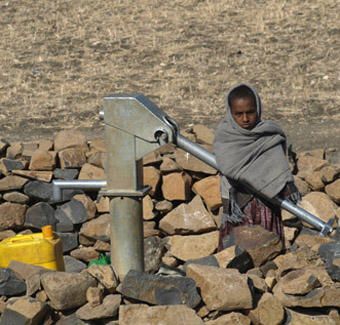Difference between revisions of "Deep-well piston handpump"
| Line 1: | Line 1: | ||
| − | |||
| − | |||
[[Image:deep-well piston handpump icon.png|right]] | [[Image:deep-well piston handpump icon.png|right]] | ||
[[Image:PistonPump.jpg|thumb|right|300px|Afridev pump: a deep-well piston handpump. <br> Photo: S.K. Industries.]] | [[Image:PistonPump.jpg|thumb|right|300px|Afridev pump: a deep-well piston handpump. <br> Photo: S.K. Industries.]] | ||
| + | |||
| + | |||
| + | With a deep-well piston handpump, the piston is placed in a cylinder below the water level, which is usually 15–45 m below the ground. The pumping motion by the user at the pump stand is transferred to the piston by a series of connected pumping rods inside the rising main. On the up-stroke, the plunger lifts water into the rising main, and replacement water is drawn into the cylinder through a foot valve. On the down-stroke, the foot valve closes, and water passes the plunger and is lifted on the next up-stroke. The pumping height is limited only by the effort needed to lift the water to the surface. Nowadays, | ||
| + | most pump cylinders have an open top. This allows the piston and foot valve to be removed through the rising main for servicing and repairs, while the rising main and cylinder stay in place. The pump rods have special connectors that allow them to be assembled or dismantled without tools, or with only very simple ones. The connecting joints incorporate pump rod centralizers that prevent wear of the rising main. To a large extent, improved models can be maintained at village level. | ||
| + | |||
| + | ==Suitable conditions== | ||
| + | '''Range of depth:''' 15–45 m, although depths of up to 100 m are possible.<br> | ||
| + | |||
| + | '''Useful life:''' 6–12 years.<br> | ||
| + | |||
| + | '''Yield:''' 0.25–0.36 litres/s at 25 m, and 0.18–0.28 litres/s at 45 m depth.<br> | ||
| + | |||
| + | '''Area of use:''' Rural and low-income periurban areas where groundwater tables are within 100 m (but preferably within 45 m) from the surface. | ||
Revision as of 21:41, 13 July 2012
With a deep-well piston handpump, the piston is placed in a cylinder below the water level, which is usually 15–45 m below the ground. The pumping motion by the user at the pump stand is transferred to the piston by a series of connected pumping rods inside the rising main. On the up-stroke, the plunger lifts water into the rising main, and replacement water is drawn into the cylinder through a foot valve. On the down-stroke, the foot valve closes, and water passes the plunger and is lifted on the next up-stroke. The pumping height is limited only by the effort needed to lift the water to the surface. Nowadays,
most pump cylinders have an open top. This allows the piston and foot valve to be removed through the rising main for servicing and repairs, while the rising main and cylinder stay in place. The pump rods have special connectors that allow them to be assembled or dismantled without tools, or with only very simple ones. The connecting joints incorporate pump rod centralizers that prevent wear of the rising main. To a large extent, improved models can be maintained at village level.
Suitable conditions
Range of depth: 15–45 m, although depths of up to 100 m are possible.
Useful life: 6–12 years.
Yield: 0.25–0.36 litres/s at 25 m, and 0.18–0.28 litres/s at 45 m depth.
Area of use: Rural and low-income periurban areas where groundwater tables are within 100 m (but preferably within 45 m) from the surface.

